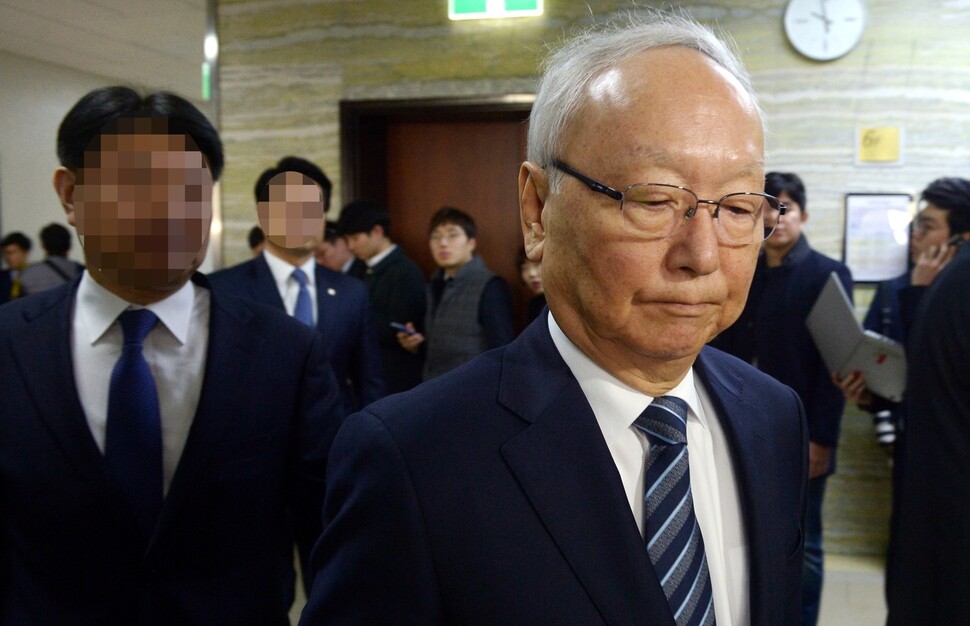hankyoreh
Links to other country sites 다른 나라 사이트 링크
NIS: Kim Jong-un ordered the assassination of Kim Jong-nam

National Intelligence Service (NIS) Director Lee Byung-ho reported before the National Assembly on Feb. 15 that the killing of Kim Jong-nam, elder brother of North Korean leader Kim Jong-un, had occurred as the result of an assassination order given by Kim Jong-un after he took power.
Lee made this report personally during a closed meeting with lawmakers on the National Assembly’s Intelligence Committee on the morning of Feb. 15. “Two Asian women approached and made contact with Kim Jong-nam, who then collapsed, and Kim asked for help and was on his way to the hospital when he died. It’s strongly presumed that this was a terror attack involving a toxic substance, but the exact cause of death will be confirmed through the postmortem,” lawmakers quoted Lee as saying. “It‘s unknown whether [the weapon] was a needle or spray,” Lee reportedly said.
“The two young female suspects who appear to have killed Kim Jong-nam got away in a taxi, but they apparently have not left Malaysia yet. The NIS has not determined how these women were connected to Kim Jong-nam,” said Lee Cheol-woo, a lawmaker with the Liberty Korea Party (formerly the Saenuri Party), and Kim Byung-gi, a lawmaker with the Minjoo Party. The two lawmakers are both on the National Assembly’s Intelligence Committee.
“While the NIS reported that the two women are ‘Asian,’ the methods they used have led intelligence agents to assume that they are North Korean agents,” Lee Cheol-woo said.
The NIS regards Kim Jong-un‘s order for Kim Jong-nam’s assassination as a “standing order” that had to be carried out unless it was rescinded. Lee Byung-ho also testified that Kim Jong-nam fled to Singapore in 2012, shortly after North Korea‘s first assassination attempt, and that he even sent a letter to Kim Jong-un asking him to “show favor and revoke the order for retribution.”
“I want you to cancel your order for retribution against me and my family. We have nowhere to go and nowhere to hide. I’m well aware that suicide is the only way I could escape,” Kim Jong-nam reportedly wrote in the letter. This implies that after five years of attempts to assassinate Kim Jong-nam, North Korea finally succeeded.
“Kim Jong-un did not carry this out because he believed that Kim Jong-nam presented a threat to his rule. Considering furthermore that he carried this out with the full awareness that it would hurt his ties with China, it can be concluded that this reflects Kim Jong-un’s monomaniacal personality,” Lee Byung-ho said.
When lawmakers asked whether Kim Jong-nam had been assassinated because of his attempts to defect, Lee said Kim Jong-nam had not attempted to do so. But Lee professed ignorance when asked whether Kim had tried to defect during the presidency of Lee Myung-bak (2008-2013), one member of the Intelligence Committee said.
In regard to this, a former official connected with foreign policy and national security said there had apparently been an attempt to arrange Kim Jong-nam’s defection in 2012, toward the end of Lee Myung-bak‘s time in office, but that this attempt had fallen through while contact was being made.
The NIS reported that it had become aware of Kim Jong-nam’s death just three or four hours after it occurred. But given the need for intelligence organizations to exchange information, the NIS could not go public with the information until Malaysian intelligence officials announced it, the agency explained.
“Since Lee Byung-ho had previously served as ambassador to Malaysia, he‘s familiar with the country and its intelligence officials, which probably enabled him to determine what had happened there rather quickly,” said Kim Byung-gi.
“We’re maintaining strong security around the clock. [North Korea] has not made contact with Thae,” Lee Byung-ho said when asked about the safety of Thae Yong-ho, a former minister-level diplomat at North Korea’s Embassy in London who recently defected to South Korea.
By Ha Eo-young and Song Kyung-hwa, staff reporters
Please direct questions or comments to [english@hani.co.kr]

Editorial・opinion
![[Column] Park Geun-hye déjà vu in Yoon Suk-yeol [Column] Park Geun-hye déjà vu in Yoon Suk-yeol](https://flexible.img.hani.co.kr/flexible/normal/500/300/imgdb/original/2024/0424/651713945113788.jpg) [Column] Park Geun-hye déjà vu in Yoon Suk-yeol
[Column] Park Geun-hye déjà vu in Yoon Suk-yeol![[Editorial] New weight of N. Korea’s nuclear threats makes dialogue all the more urgent [Editorial] New weight of N. Korea’s nuclear threats makes dialogue all the more urgent](https://flexible.img.hani.co.kr/flexible/normal/500/300/imgdb/original/2024/0424/7317139454662664.jpg) [Editorial] New weight of N. Korea’s nuclear threats makes dialogue all the more urgent
[Editorial] New weight of N. Korea’s nuclear threats makes dialogue all the more urgent- [Guest essay] The real reason Korea’s new right wants to dub Rhee a founding father
- [Column] ‘Choson’: Is it time we start referring to N. Korea in its own terms?
- [Editorial] Japan’s rewriting of history with Korea has gone too far
- [Column] The president’s questionable capacity for dialogue
- [Column] Are chaebol firms just pizza pies for families to divvy up as they please?
- [Column] Has Korea, too, crossed the Rubicon on China?
- [Correspondent’s column] In Japan’s alliance with US, echoes of its past alliances with UK
- [Editorial] Does Yoon think the Korean public is wrong?
Most viewed articles
- 1‘We must say no’: Seoul defense chief on Korean, USFK involvement in hypothetical Taiwan crisis
- 2N. Korean delegation’s trip to Iran shows how Pyongyang is leveraging ties with Moscow
- 3Amnesty notes ‘erosion’ of freedom of expression in Korea in annual human rights report
- 4[Column] Park Geun-hye déjà vu in Yoon Suk-yeol
- 5‘Weddingflation’ breaks the bank for Korean couples-to-be
- 6[Reportage] On US campuses, student risk arrest as they call for divestment from Israel
- 7[Editorial] New weight of N. Korea’s nuclear threats makes dialogue all the more urgent
- 8Korea sees more deaths than births for 52nd consecutive month in February
- 9Will NewJeans end up collateral damage in internal feud at K-pop juggernaut Hybe?
- 10Why Korea shouldn’t welcome Japan’s newly beefed up defense cooperation with US